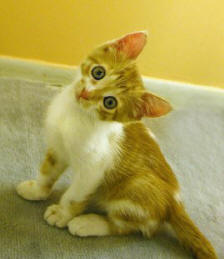Dealing
With The "Kitten Crazies"
(Exuberant Play Sessions)
 This
crazy play behavior can be delightful
entertainment but quite annoying
if you're trying to sleep.
Although domestic cats are not
truly nocturnal, it is normal
for kittens to have some high
activity in the late evening
and early morning hours. In
addition to disrupting human
sleep, this behavior can result
in destruction of fragile household
items.
This
crazy play behavior can be delightful
entertainment but quite annoying
if you're trying to sleep.
Although domestic cats are not
truly nocturnal, it is normal
for kittens to have some high
activity in the late evening
and early morning hours. In
addition to disrupting human
sleep, this behavior can result
in destruction of fragile household
items.
 The
first step is to kitten-proof
your house. This period will
pass as the kitten grows into
an adult, so temporarily remove
and store valuables that might
be knocked over or damaged.
The
first step is to kitten-proof
your house. This period will
pass as the kitten grows into
an adult, so temporarily remove
and store valuables that might
be knocked over or damaged.
|
Although
domestic cats are not truly
nocturnal, it is normal
for kittens to have some
high activity in the late
evening and early morning
hours. |
 Once
the house is kitten-proofed,
keep your bedroom door closed
and the kitten out
while you are trying to sleep.
Don't let the kitten in
if he cries since that rewards
an inappropriate behavior and
you will have to deal with that
problem for a long time.
Once
the house is kitten-proofed,
keep your bedroom door closed
and the kitten out
while you are trying to sleep.
Don't let the kitten in
if he cries since that rewards
an inappropriate behavior and
you will have to deal with that
problem for a long time.
You
may also intentionally deny
sleep to the kitten during the
early evening. The best time
for this activity is shortly
before bed; it makes him discharge
his energy and encourages him
to sleep throughout the night.
In addition, the play sessions
tend to increase your bond with
the kitten. Wake him if he's
napping. Move him frequently
and try to play with him. To
engage his interest and keep
him active, use all the commercial
cat toys you bought at the pet
store.

 Consider
adopting another well-socialized,
friendly kitten of approximately
the same age. These two will
likely play with each other,
have great fun, entertain you,
and be tired enough to sleep
throughout the night.
Consider
adopting another well-socialized,
friendly kitten of approximately
the same age. These two will
likely play with each other,
have great fun, entertain you,
and be tired enough to sleep
throughout the night.
Dealing
With "Adult Crazies"
 Adult
cats who seem hyperactive have
two possible explanations. One
is that they are "genetically
wired" with lots of energy.
If these cats are kept indoors,
the energy builds up and has
to be released, often with bursts
of speed, or sometimes with
attacks on people. The key strategy
is to give an energy outlet
such as flutter toys, and chase-the- string games.
Adult
cats who seem hyperactive have
two possible explanations. One
is that they are "genetically
wired" with lots of energy.
If these cats are kept indoors,
the energy builds up and has
to be released, often with bursts
of speed, or sometimes with
attacks on people. The key strategy
is to give an energy outlet
such as flutter toys, and chase-the- string games.
 Another
reason a cat may seem hyperactive
is incompatible sleep pattern
schedules. This means that the
cat is sleeping all day and
has too much energy at night.
Remember that cats are instinctively
nocturnal hunters. This is why
nature gave them whiskers and
such excellent night vision.
Another
reason a cat may seem hyperactive
is incompatible sleep pattern
schedules. This means that the
cat is sleeping all day and
has too much energy at night.
Remember that cats are instinctively
nocturnal hunters. This is why
nature gave them whiskers and
such excellent night vision.
Ideally, you could stay home
and wake up the cat during the
day to encourage sleeping throughout
the night. Another alternative
is to try to modify the activity
by using a shake can if the
activity disturbs you, and ignoring
everything else. The final alternative
is to lock cats out of the bedroom
at night so you can get some
rest.